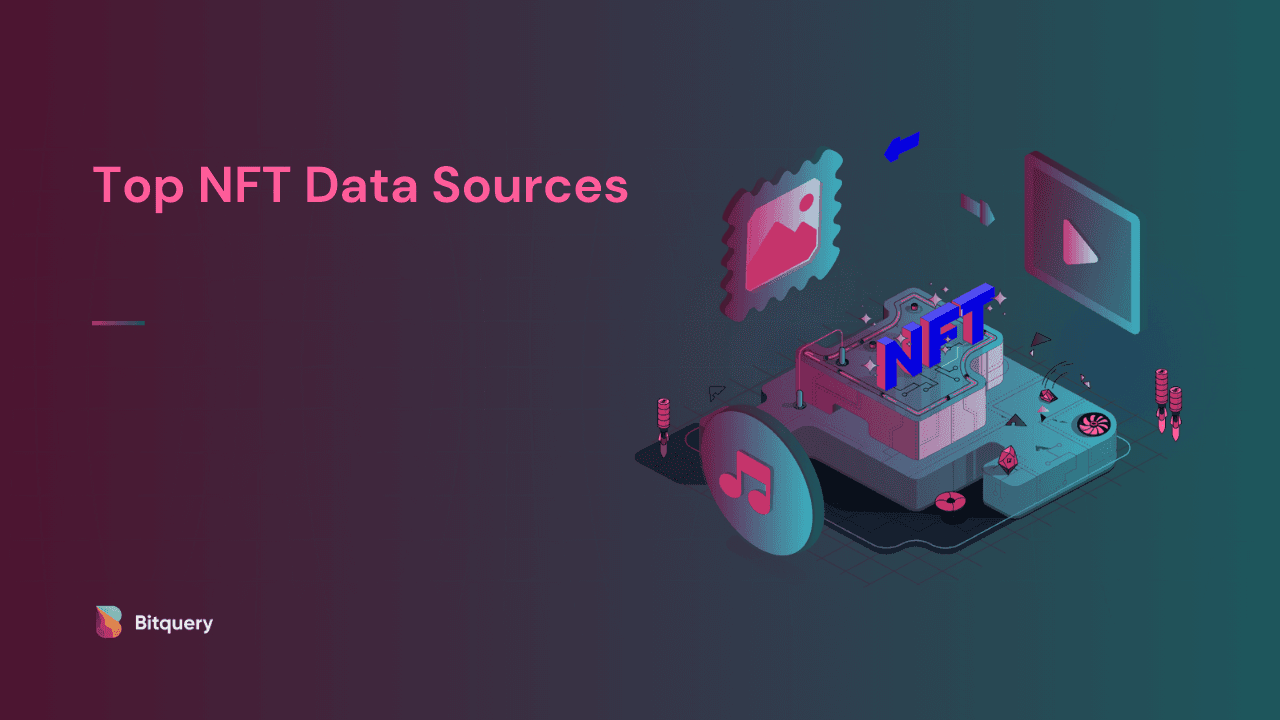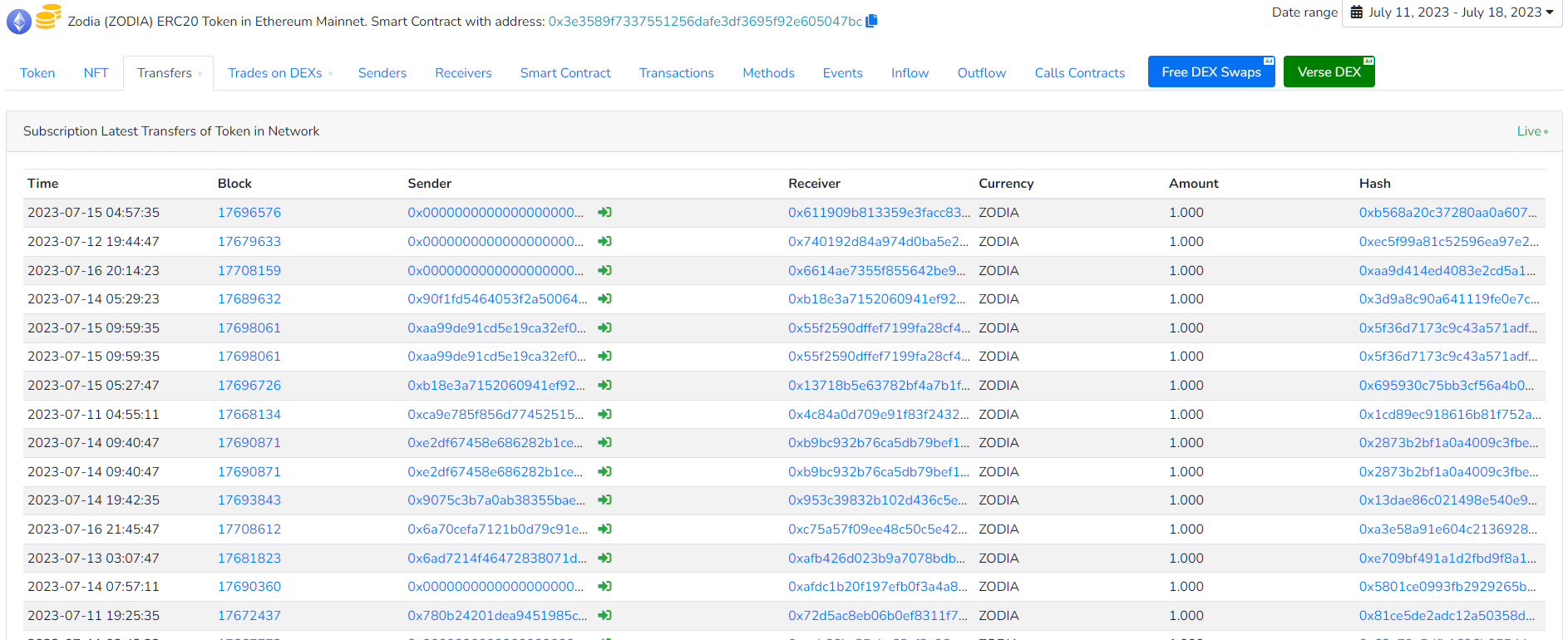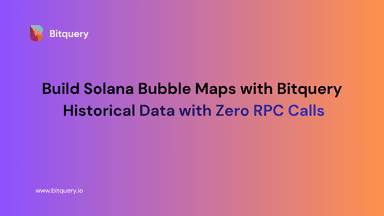
Top NFT Data Sources
APIs are the key to unlocking the full potential of NFTs. Without APIs, NFTs would be much more difficult to use and would not be as accessible to everyone. ]NFT APIs make it possible for developers to create new and innovative NFT applications, and they allow users to easily interact with NFTs.
In this blog, we will discuss some of the best NFT data sources to help you build your next NFT dApp. We will cover a variety of sources, including marketplace APIs, data providers, node providers, and analytics tools.
Table of Contents
Bitquery
As a blockchain data company, Bitquery provides data on NFTs through its explorer, APIs and AWS cloud marketplace.
Bitquery Explorer: Mastering the NFT Market at Your Fingertips

Source: https://explorer.bitquery.io/ethereum/token/0x3e3589f7337551256dafe3df3695f92e605047bc/nft_smart_contractIt provides comprehensive data on NFTs, from collection IDs to transfer history. This data can help you make informed decisions about buying, selling, or studying market trends.
For example you can see the top holders of Zodia NFT in the screenshot below, providing a glimpse into the strategies of the most successful investors. This isn’t just about observing the market; it’s about mastering it.

Trust and Validate: Bitquery’s Ownership API
Bitquery’s Ownership API is a tool that validates the provenance of each NFT. It is like a trusted referee ensuring fair play in the NFT ecosystem. Using this API is your first step towards fostering trust within the ecosystem and protecting yourself from counterfeits.
Real-Time Mastery: Transfer API
The Transfer API can be used to track the flow of NFTs between buyers and sellers or used to track NFT transactions that are subject to regulatory compliance requirements. These are some of the examples of what you can do with extensive NFT transfers information.

Transparent Control: Calls API
Your interaction with NFTs and their corresponding smart contracts is made transparent with Bitquery’s Calls API, sharing data on state-changing and view calls.
Unveil Market Insights: Trades API
To further enhance your market strategy, the Trades API offers a comprehensive overview of different marketplaces including Opensea, Blur, and so on. Track the number of NFT traders, popular NFTs, average prices and so much more.
Engaging Narratives: Enhance NFT Experiences with Metadata API
Finally, the Metadata API gives you information on the NFT itself and on the NFT collection you’re interested in.
With Bitquery’s APIs, you’re not just playing the NFT game; you’re mastering it. Gear up by signing up for a free developer account with Bitquery today and dive headfirst into the exhilarating world of NFTs.
OpenSea
OpenSea’s API offers information about NFTs listed on its platform. The information includes details of listed items, their sales history, and ownership specifics. Users can also access data regarding the metadata of the ERC721 standard tokens.
The API is available for free with a rate limit. For enterprise usage, you can request a separate key from them.
Alchemy
Alchemy’s API is designed for interaction with the Ethereum blockchain, a platform known for the share of non-fungible token transactions. The API provides functionalities to retrieve block and transactional data, send transactions, and interact with smart contracts.
Alchemy’s API can prove to be a resource for developers working on NFT applications, as it can deliver vital data about NFT transactions happening on the Ethereum blockchain.
It can facilitate the extraction of information required to understand the complexities of the NFT environment on Ethereum, providing inputs for strategizing in the NFT domain.
Covalent
Covalent offers a unified API designed for developers working on NFT applications involving multiple blockchains.
The API enables the extraction of blockchain transaction data across numerous chains, including information related to ERC721 transfers. Covalent Unified API gives you different endpoints like “Get Historical Data for NFT Collection” to get different details on NFTs. Covalent offers free and premium plans with different requests per second limit.
Infura
Infura’s API provides access to the Ethereum network and the InterPlanetary File System (IPFS), commonly used for hosting NFT metadata.
Infura provides both SDK (available in JavaScript and TypeScript) and REST APIs. It supports many chains including Ethereum, Arbitrum, and Polygon NFTs.
Infura has a free plan with rate limits on requests and different paid plans with different Total Requests/Day.
TheGraph
The Graph’s API enables developers to build and publish open APIs, known as subgraphs which makes NFT data accessible. For example, you can users build NFT Sales indexers that return details on bidder and bid amounts.
The pricing is dynamic and depends on the query that you run to build the subgraph.
Moralis
Moralis’ NFT API gives both real-time and archival data on NFTs. You can get ownership, transfers, and metadata on different NFTs. It also has a Streams API to get real notifications on NFT trades.
Moralis has different pricing plans based on different request limits starting with a free plan.
QuickNode
Quicknode provides Solana and Ethereum NFT data through its NFT API. The API has different endpoints like qn_fetchNFTsByCollection that give you aggregated data on NFTs.
Quicknode has a free plan with 25 Requests /sec limit and two other paid plans with higher rate limits.
NFTPort
NFTPort’s API simplifies several aspects of NFT development, including minting NFTs and pulling in marketplace data. NFTPort assists developers in interacting with multiple NFT marketplaces and networks.
Guest blog written by Hamid Akhtar
Subscribe to our newsletter
Subscribe and never miss any updates related to our APIs, new developments & latest news etc. Our newsletter is sent once a week on Monday.


